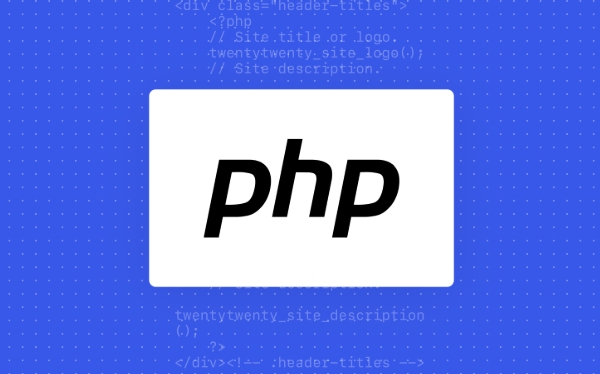What is the difference between PHP sessions and cookies?
Jul 09, 2025 am 02:18 AMThe difference between Sessions and cookies is in the location of data storage and management. 1. Cookies are stored in the user's browser and can be viewed and modified, suitable for persisting non-sensitive data; 2. Session data is stored on the server, and only sends the session ID to the browser, suitable for storing sensitive information; 3. Cookies can exist for a long time by default, and the session usually ends with the browser's closing; 4. Use sessions to handle authentication and temporary tracking, and use cookies to remember user preferences; 5. In terms of security, sensitive cookie data needs to be encrypted, avoid directly storing sensitive information, protect session IDs, and enable HTTPS transmission.

The difference between PHP sessions and cookies come down to where the data is stored and how it's managed. Cookies are stored on the user's browser, while sessions are stored on the server. That one key distinction affects security, lifespan, and how you use each in your web applications.

Where Data Is Stored Matters
With cookies , all the data you set (like a username or preferences) lives directly in the user's browser. You send this data to the client side, and it gets sent back every time the user makes a request.
Sessions , on the other hand, store most of the data on the server — usually in files or a database. What gets sent to the browser is just a session ID, which acts like a key to unlock the data stored server-side.

This means:
- Cookies can be viewed and modified by the user.
- Session data itself can't be tampered with directly by the user (though the session ID still needs protection).
So if you're storing something sensitive like login status or personal info, sessions are the safer bet.

How Long Each Lasts
By default, cookies can last as long as you want — you set an expiration time when you create them. If you don't, they'll disappear when the browser closes.
Sessions are temporary by nature. Normally, a session lasts only until the browser is closed. But that behavior can depend on some settings, like whether the session cookie has an expiration or not.
If you want to keep users logged in after they close their browser, cookies are the way to go — but again, make sure you're not storing anything sensitive directly in them.
When to Use Sessions vs Cookies
Use sessions for:
- Storing sensitive or complex data
- Managing user authentication
- Temporary tracking during a visit
Use cookies for:
- Remembering user preferences (like theme or language)
- Tracking non-sensitive data across visits
- Lightweight storage that doesn't require server resources
For example, if you're building a shopping cart system:
- Sessions might hold the full cart contents securely.
- A cookie might just remember the cart ID or a non-sensitive setting like preferred currency.
You can also mix both — using a cookie to identify a session or trigger certain behaviors, while keeping the actual data safe on the server.
Security Considerations
Since cookies live on the user's machine, they're more vulnerable. Always encrypt or hash sensitive data before putting it in a cookie, or better yet, avoid storing sensitive stuff there entirely.
Sessions aren't completely secure just because they're server-based. Session IDs passed around in cookies can still be hijacked. So always:
- Regenerate session IDs after login (
session_regenerate_id()) - Set secure cookie flags for sessions
- Use HTTPS to protect session IDs in transit
It's easy to think sessions are foolproof, but they still need careful handling.
So yeah, sessions and cookies do similar things — storing data across requests — but how and where they store that data makes all the difference. Pick based on what you're trying to save, how secure it needs to be, and how long you need it to stick around.
The above is the detailed content of What is the difference between PHP sessions and cookies?. For more information, please follow other related articles on the PHP Chinese website!

Hot AI Tools

Undress AI Tool
Undress images for free

Undresser.AI Undress
AI-powered app for creating realistic nude photos

AI Clothes Remover
Online AI tool for removing clothes from photos.

Clothoff.io
AI clothes remover

Video Face Swap
Swap faces in any video effortlessly with our completely free AI face swap tool!

Hot Article

Hot Tools

Notepad++7.3.1
Easy-to-use and free code editor

SublimeText3 Chinese version
Chinese version, very easy to use

Zend Studio 13.0.1
Powerful PHP integrated development environment

Dreamweaver CS6
Visual web development tools

SublimeText3 Mac version
God-level code editing software (SublimeText3)

Hot Topics
 How to check if PHP session has been started?
Aug 28, 2023 pm 09:25 PM
How to check if PHP session has been started?
Aug 28, 2023 pm 09:25 PM
In PHP, we use the built-in function session_start() to start a session. But the problem we have with the PHP script is that if we execute it more than once, it throws an error. So, here we will learn how to check if the session has been started without calling the session_start() function twice. There are two ways to solve this problem. For PHP5.4.0 and below. Example<?php if(session_id()==''){
 Are there any alternatives to PHP sessions?
Apr 29, 2025 am 12:36 AM
Are there any alternatives to PHP sessions?
Apr 29, 2025 am 12:36 AM
Alternatives to PHP sessions include Cookies, Token-based Authentication, Database-based Sessions, and Redis/Memcached. 1.Cookies manage sessions by storing data on the client, which is simple but low in security. 2.Token-based Authentication uses tokens to verify users, which is highly secure but requires additional logic. 3.Database-basedSessions stores data in the database, which has good scalability but may affect performance. 4. Redis/Memcached uses distributed cache to improve performance and scalability, but requires additional matching
 How do PHP sessions differ from cookies?
May 02, 2025 am 12:03 AM
How do PHP sessions differ from cookies?
May 02, 2025 am 12:03 AM
PHPsessionsareserver-side,whilecookiesareclient-side.1)Sessionsstoredataontheserver,aremoresecure,andhandlelargerdata.2)Cookiesstoredataontheclient,arelesssecure,andlimitedinsize.Usesessionsforsensitivedataandcookiesfornon-sensitive,client-sidedata.
 How to handle PHP session expiration errors and generate corresponding error messages
Aug 08, 2023 pm 02:18 PM
How to handle PHP session expiration errors and generate corresponding error messages
Aug 08, 2023 pm 02:18 PM
How to handle PHP session expiration errors and generate corresponding error messages. When developing with PHP, it is very important to handle session expiration errors, because session expiration will cause users to be forced to exit when performing some sensitive operations, and will also bring problems to users. Bad experience. This article will introduce how to handle PHP session expiration errors and generate corresponding error messages to help developers better handle this situation. In PHP, session expiration is mainly determined by the session timeout. When a session exceeds the set timeout,
 Methods to solve PHP session failure errors and generate corresponding error prompts
Aug 07, 2023 am 09:48 AM
Methods to solve PHP session failure errors and generate corresponding error prompts
Aug 07, 2023 am 09:48 AM
Methods to solve PHP session invalidation errors and generate corresponding error prompts. When developing PHP applications, Session is a mechanism used to track and store user data. It can store important information such as the user's login status, shopping cart contents, etc. However, when using sessions, we sometimes encounter the problem of session invalidation, which will cause the user's data to be lost, and even cause the application functions to not function properly. This article will introduce how to solve the PHP session failure error and generate the corresponding error message. Check session timeout
 How to solve the problem of Nginx forwarding lost cookies
May 15, 2023 pm 09:10 PM
How to solve the problem of Nginx forwarding lost cookies
May 15, 2023 pm 09:10 PM
1. Lost Cookies Operation path one: http://localhost:8080/content/requestAction!showMainServiceReqDetail.action path two: http://localhost/content/requestAction!showMainServiceReqDetail.action path three: http://localhost/clp/ requestAction!showMainServiceReqDetail.action path one is direct access, path two is the same as path
 What are some common problems that can cause PHP sessions to fail?
Apr 25, 2025 am 12:16 AM
What are some common problems that can cause PHP sessions to fail?
Apr 25, 2025 am 12:16 AM
Reasons for PHPSession failure include configuration errors, cookie issues, and session expiration. 1. Configuration error: Check and set the correct session.save_path. 2.Cookie problem: Make sure the cookie is set correctly. 3.Session expires: Adjust session.gc_maxlifetime value to extend session time.
 What is the main purpose of using sessions in PHP?
Apr 22, 2025 pm 05:25 PM
What is the main purpose of using sessions in PHP?
Apr 22, 2025 pm 05:25 PM
The main purpose of using sessions in PHP is to maintain the status of the user between different pages. 1) The session is started through the session_start() function, creating a unique session ID and storing it in the user cookie. 2) Session data is saved on the server, allowing data to be passed between different requests, such as login status and shopping cart content.






